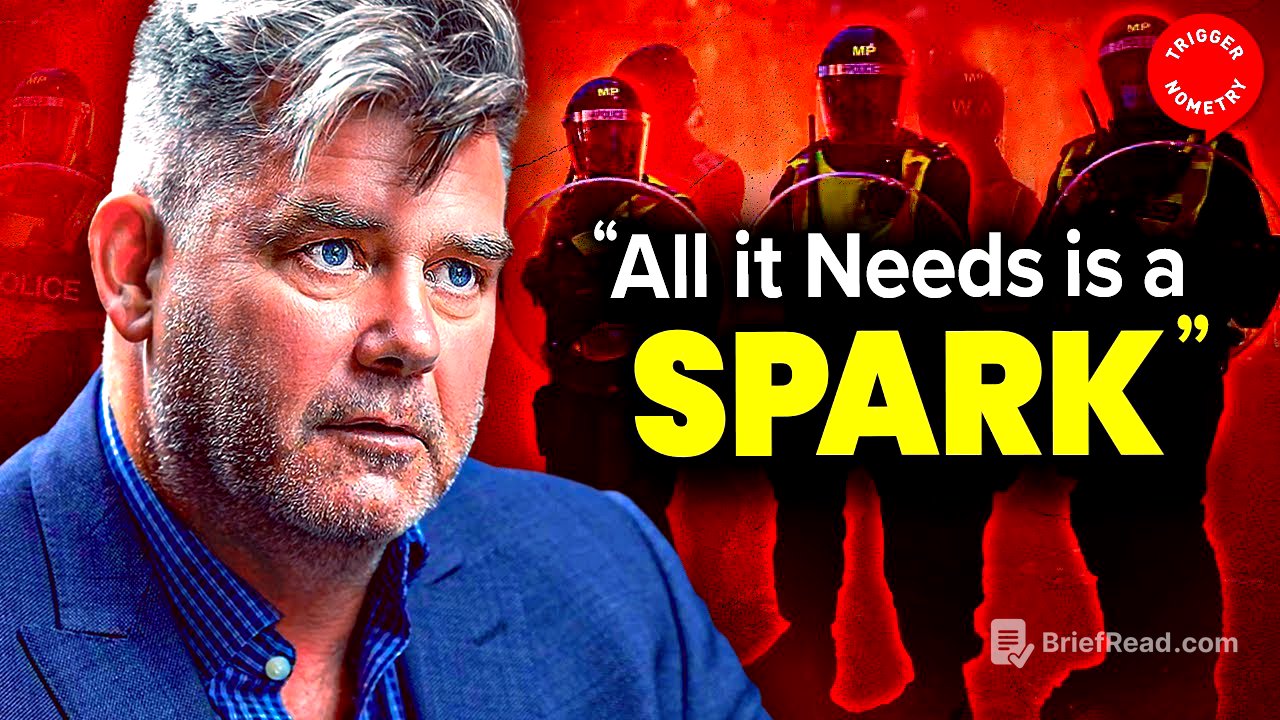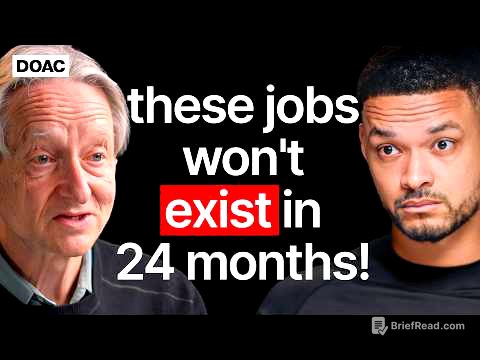TLDR;
This episode of Triggernometry features David Betts, a professor of war studies, discussing the rising risks of civil unrest in Western societies, particularly in Europe and the UK. He explains the factors contributing to this risk, including multiculturalism, factionalism, and loss of faith in political institutions. Betts also addresses potential counterarguments and what could spark a civil war, as well as the role of social media. The conversation concludes with a discussion on what a post-turmoil society could look like and the importance of envisioning a positive future.
- The risk of civil war in Western societies is increasing due to factors like multiculturalism, factionalism, and loss of faith in political institutions.
- Multiculturalism erodes pre-political loyalty, making it difficult for democratic systems to function legitimately.
- A unified and competent elite is essential to prevent civil war, but current elites are neither unified nor competent.
- Social media contributes to societal fracturing and allows extremes to find each other, exacerbating the risk of civil unrest.
- The spark for a civil war is unpredictable, but the underlying conditions (the "tinder") are more important.
Introduction to David Betts and the Risks of Civil War [0:45]
David Betts, a professor in the war studies department at King's College London, specialises in contemporary strategy and military affairs, particularly insurgency and counterinsurgency. His research, traditionally focused on internal conflicts in foreign countries, has increasingly turned to the conditions within Western societies that mirror those conducive to insurgency. Betts highlights the diminishing perception of political legitimacy as a key concern, suggesting that governments are inadvertently undermining their own authority. He admits reluctance to discuss the topic publicly due to its sensitive nature and potential for alienating others, but feels compelled to do so out of conscience and a sense of urgency.
Criticism and the Actualisation Issue [6:02]
Betts addresses the criticism he receives from friends and colleagues, who often fear that by speaking about the possibility of civil unrest, he is somehow actualising or inciting it. He clarifies that his intention is not to call for conflict, but to provide an informed assessment based on his understanding of societal dynamics. He uses the analogy of an astronomer predicting a meteor strike to illustrate the difference between observation and advocacy. While he acknowledges that human behaviour can be influenced by media, he maintains that his analysis is a warning, not a call to action.
Insurgency as a Social Movement [8:06]
Betts explains that insurgency should be viewed as a social movement, with the violent acts often associated with it being only the visible tip of the iceberg. He emphasises that social movements are normal in any society and are essential for driving change. Insurgency differs from normal social movements only in that it involves actions that go beyond the law. He uses Nelson Mandela's decision to form the armed wing of the ANC as an example of when a social movement might decide that change cannot be achieved within the existing legal framework. The key point is that insurgency is driven by a large, underlying energy that is mostly hidden beneath the surface.
The Definition of Civil War [16:46]
Betts defines civil war as a form of war in which the belligerent parties were under the same sovereign authority at the outbreak of the war. He uses this definition to highlight the internal origin of the conflict, as opposed to external factors. While acknowledging that terms like revolution, uprising, and rebellion could also apply, he avoids them because they imply something more short-term and spasmotic. Betts wants to draw attention to the long-term processes and prehistory that lead to civil war, emphasising that it is not a short-term event.
The Role of Multiculturalism [21:53]
Betts identifies multiculturalism as the most important factor contributing to the risk of civil unrest, estimating its significance at 90%. He defines multiculturalism as the promotion of a worldview where different cultures and religions coexist without integrating into a central, dominant culture. This erodes the sense of pre-political loyalty necessary for a normally functioning political system. Without a unified pre-political loyalty, people are less likely to accept decisions made by the political system, even if they disagree with them. He argues that moving to a multicultural, post-national model is destructive to the way Western states have governed themselves.
Ethnic and Confessional Makeup of Society [28:37]
Betts discusses how the ethnic and confessional makeup of society relates to civil war. He describes a bell curve where both very heterogeneous and very homogeneous societies have a low potential for civil war. Very homogeneous societies can easily reach consensus, while very heterogeneous societies make it difficult for any one group to dominate. The most vulnerable state is at the top of the curve, where a formerly dominant majority fears losing its status. This fear, combined with the group's still significant size, creates a high propensity for civil conflict, a situation currently faced in Britain and Western Europe.
Downgrading, Factionalism, and Loss of Faith [33:36]
Betts identifies three main factors that indicate the potential for civil war: downgrading (status loss by a formerly dominant majority), factionalism, and loss of faith in the ability of normal politics to solve problems. Downgrading is the perception among the native populations of Europe that they are being displaced in their own homelands. Factionalism, particularly polar factionalism, occurs when people prioritise their faction's interests over the national interest. Loss of faith is measured by declining trust in political institutions, which Betts sees as a proxy for legitimacy. He argues that Britain is in the "sweet spot" for all three factors, making it particularly vulnerable.
Barriers to Civil War: Wealth and Obedience [45:19]
Betts discusses traditional barriers to civil war in Western countries, such as wealth and a customary habit of obedience. He suggests that Western economies are reaching the end of their ability to use financial measures to paper over societal problems. While Britain has historically had a culture of obedience and a competent governing elite, he questions whether this is still the case. He notes that the current elite is neither competent nor unified, as evidenced by elite defections and the rise of new political movements.
Elite Defections and the Fracturing of the Elite [50:45]
Betts points out that the elite is fracturing, with members looking out for their own interests rather than working together for the common good. He sees the emergence of new political movements like Reform as expressions of the feeling that the system is broken. He also highlights the "uni party" phenomenon, where the true allegiances of the power elite become more obvious, suggesting that much of what is presented as political debate is merely drama.
The Role of Reform and the Potential for Subversion [54:21]
Betts expresses scepticism about the ability of Reform to bring about meaningful change, suggesting it may be a pressure valve that ultimately reinforces the status quo. He questions the electability and intentions of Reform, and even if it were to gain power, he believes it could be subverted by the state bureaucracy. He argues that the pace of political change is not keeping up with the growing sense of urgency among the population, which is driving the breakdown of the political system.
The Spark and the Tinder [1:03:00]
Betts uses the metaphor of tinder and a spark to explain how civil war might be triggered. He emphasises that the important thing is not the spark itself, but the underlying conditions (the tinder) that make society vulnerable. He suggests that the spark could be another horrific attack, the steady drip of revelations from the gang inquiry, or something entirely unpredictable. He also notes that people are increasingly inclined to fight, and extremists know how to exploit existing fractures in society.
System Disruption and the Vulnerability of Cities [1:17:54]
Betts discusses the concept of system disruption, which involves attacking infrastructure to cause cascading effects and unbalance an already precarious system. He points out the vulnerability of cities, which rely on external resources and are socially unstable. He suggests that switching off gas and electricity to London, for example, could lead to widespread chaos and economic collapse.
The Peril of the Reformer [1:26:00]
Betts introduces the concept of the "peril of the reformer," using Mikhail Gorbachev as an example. He argues that when a reformer acknowledges the problems and begins to implement changes, people's expectations rise more quickly than their ability to deliver. This can lead to disillusionment and further instability. He suggests that even if Reform were to gain power and implement some of its policies, it may not be enough to satisfy the population's desire for change.
Envisioning a Positive Future [1:34:06]
Betts concludes by emphasising that he does not wish for any of the negative outcomes he has described. He acknowledges that there are other potential avenues to the future and that his perspective may be limited by his background as a war studies professor. He suggests that society should spend time thinking about what kind of country it wants to be after this period of turmoil, in order to put a positive future on the end of it.









